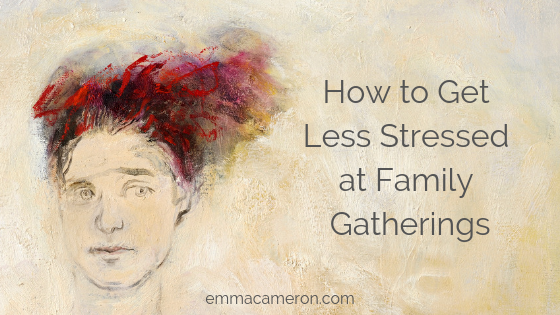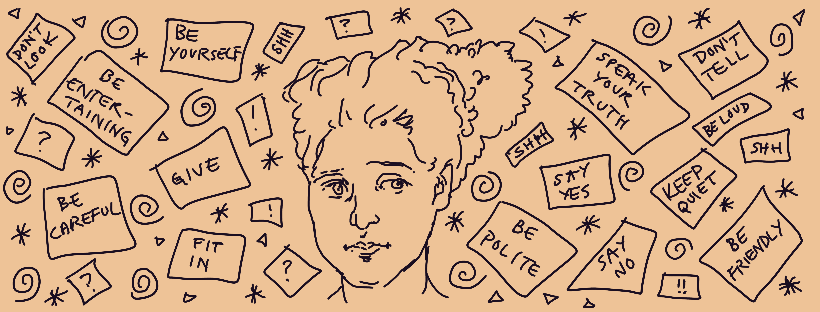
Whether it’s a festival like Christmas, Hanukkah, or Eid; a wedding or a ‘big’ birthday: a family gathering can be really stressful. Especially if you’re a thoughtful sensitive person. Here are a few tips to help you get a bit less stressed at family gatherings.
Stop People-Pleasing
If you’ve spent your life trying to fit in, do the expected thing, and keep everyone happy, stopping people-pleasing won’t come naturally. But to get less stressed at family gatherings, you have to be able to set boundaries and say no sometimes. And yes, there’s a risk that others may not like it!
Here are three things that can help you with saying ‘no’ around family gatherings:
1. Pause
Remember that you can press ‘pause’ before you give an answer. Practise saying ‘Thank you for asking me! I’ll have a think about that, and I’ll get back to you tomorrow’.
2. Get a wider perspective
You may be tempted to say ‘yes’ because you don’t want to disappoint the person who asked you. But stop and think about who else might be affected if you say ‘yes’. For example, your partner or child may miss out on spending much-needed quality time with you because you’ve agreed to spend time doing something for your neighbour’s sister-in-law. People-pleasers often prioritise the needs and wants of people in their ‘outer circle’, over the needs and wants of those who they love the most, their ‘inner circle’.
3. You don’t need to justify yourself
It really is okay to say with a firm but friendly smile ‘No, unfortunately I’m not in a position to do that, at this time’ – and not give a single further explanation. If the other person looks crestfallen or annoyed, remind yourself that they are entitled to their feelings, and they’ll survive.
Tips to help the thoughtful, sensitive person get less stressed at family gatherings Share on X
Understand Your Needs – and Communicate Them
If most people in your family gathering are extroverts, while you’re an introvert and/or an HSP (Highly Sensitive Person), it can be difficult not to feel that you’re a bit ‘odd’. Many people (though not all, thankfully) genuinely cannot understand why someone might need to retire to a quiet place for an hour, or not want to spend the evening partying after a whole day of back-to-back social gatherings.
You may want to help other people understand that when you decide to opt out of something, it’s not about you being awkward, unfriendly or snobbish. Do you generally prefer an intimate one-to-one talk rather than a boisterous group conversation? If so, perhaps you can just explain that, so you don’t get mislabelled or pushed into a mould that doesn’t fit. Aim to talk about it with family members ahead of time, rather than in the heat of the moment.
Get Back in your ‘Adult Chair’
At a family gathering, we can be thrown back into a complex mix of emotional states that hark back to our childhood and adolescence. You can read more about the ‘Three Chairs’ metaphor here.
Ground yourself so that you don’t get swept up in emotional reactivity (you’ll find 12 easy ways to ground yourself here).
Drop the Blame
We humans love placing blame!
We have evolved as meaning-making creatures, and we just can’t resist making experience into stories. This is in many ways a lovely, precious aspect of being human. But stories can easily slide into attributing cause and effect – especially at a family gathering. Simply put: sometimes it’s hard to resist blaming our family for how we are.
- ‘Look how my Dad is behaving – no wonder I have social anxiety!’
- ‘With a show-off sister like that, I didn’t stand a chance.’
- ‘Look at this dump. No wonder I grew up unable to be organised.’
- ‘Mum’s obsessed with dieting. She made me unable to ever relax around food.’
Now, often there’s more than a pinch of truth underlying many of our blame-stories. A mother who is anxious about weight and eating (her own or her child’s) is at high risk of passing on issues around food and body image to her child. A child who grew up in a chaotic home where nothing ever happened on time may develop either very disorganised habits, or become rigidly controlling and anxious. And so on.
Blaming Keeps Us Stuck
When we are locked into stories of blame we can become obsessed with wanting others to recognise their ‘wrongdoing’, and we can get so fixated on what’s wrong (and why it’s wrong), that we rob ourselves of chances to celebrate our aliveness. We miss out on revelling in our messy, imperfect, yet deeply valuable connections with others. Through focusing too much on what’s wrong, we can stop noticing what’s good-enough and true and warm and real.
How do I know all this? Well, partly because I have a tendency to do this too! And I know what a difference it can make when I step back from the temptation of blaming (because let’s face it, blaming comes laced with its own perverse kind of satisfaction!) and move into a more grounded, appreciative place of recognising that we are all flawed, including me.
How to get less stressed at family gatherings: a guide for the thoughtful, sensitive person Share on X
What are your tips for how to get less stressed at family gatherings?
I hope these tips will help you find ways to get less stressed at family gatherings. What else have you found helpful? Let me know in the comments below!
I offer online therapy to thoughtful, creative people and HSP’s in the UK and abroad. Email me, telling me a bit about what you’re looking for help with, at espcameron[at]protonmail.com, and book your free 15-minute phone consultation.
Leave a Reply